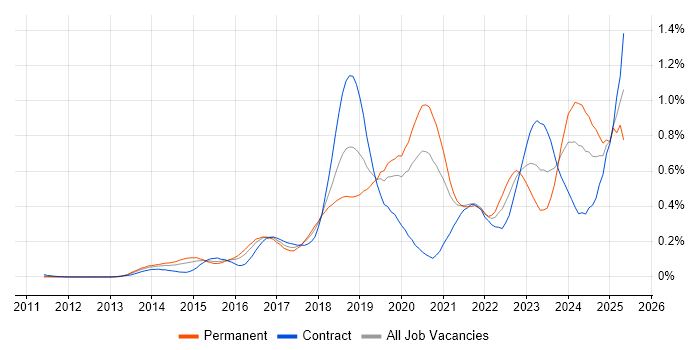Pandas
Central London > City of London
The table below provides summary statistics and salary benchmarking for jobs advertised in the City of London requiring Pandas skills. It covers permanent job vacancies from the 6 months leading up to 12 January 2026, with comparisons to the same periods in the previous two years.
| 6 months to 12 Jan 2026 |
Same period 2025 | Same period 2024 | |
|---|---|---|---|
| Rank | 128 | 147 | 150 |
| Rank change year-on-year | +19 | +3 | +58 |
| Permanent jobs citing Pandas | 6 | 16 | 17 |
| As % of all permanent jobs in the City of London | 0.27% | 0.61% | 0.60% |
| As % of the Libraries, Frameworks & Software Standards category | 1.41% | 2.08% | 2.05% |
| Number of salaries quoted | 4 | 7 | 16 |
| 10th Percentile | - | £65,750 | £60,375 |
| 25th Percentile | £42,500 | £79,375 | £68,750 |
| Median annual salary (50th Percentile) | £55,000 | £110,000 | £90,000 |
| Median % change year-on-year | -50.00% | +22.22% | +28.57% |
| 75th Percentile | £93,750 | - | £96,250 |
| 90th Percentile | £141,000 | - | £110,000 |
| Central London median annual salary | £65,000 | £102,500 | £90,000 |
| % change year-on-year | -36.59% | +13.89% | +28.57% |
All Software Libraries and Frameworks
City of London
Pandas falls under the Software Libraries and Frameworks category. For comparison with the information above, the following table provides summary statistics for all permanent job vacancies requiring technical specification, industry standards, software libraries and framework skills in the City of London.
| Permanent vacancies with a requirement for technical specification, industry standards, software libraries and framework skills | 425 | 771 | 829 |
| As % of all permanent jobs advertised in the City of London | 18.81% | 29.17% | 29.15% |
| Number of salaries quoted | 359 | 559 | 768 |
| 10th Percentile | £57,500 | £52,500 | £52,500 |
| 25th Percentile | £67,500 | £56,250 | £62,500 |
| Median annual salary (50th Percentile) | £85,000 | £75,000 | £85,000 |
| Median % change year-on-year | +13.33% | -11.76% | +3.03% |
| 75th Percentile | £108,750 | £97,500 | £106,250 |
| 90th Percentile | £126,025 | £117,500 | £116,250 |
| Central London median annual salary | £86,750 | £75,000 | £85,000 |
| % change year-on-year | +15.67% | -11.76% | +6.25% |
Pandas
Job Vacancy Trend in the City of London
Historical trend showing the proportion of permanent IT job postings citing Pandas relative to all permanent IT jobs advertised in the City of London.

Pandas
Salary Trend in the City of London
Salary distribution trend for jobs in the City of London citing Pandas.

Pandas
Salary Histogram in the City of London
Salary distribution for jobs citing Pandas in the City of London over the 6 months to 12 January 2026.
Pandas
Co-Occurring Skills & Capabilities in the City of London by Category
The following tables expand on the one above by listing co-occurrences grouped by category. They cover the same employment type, locality and period, with up to 20 co-occurrences shown in each category:
